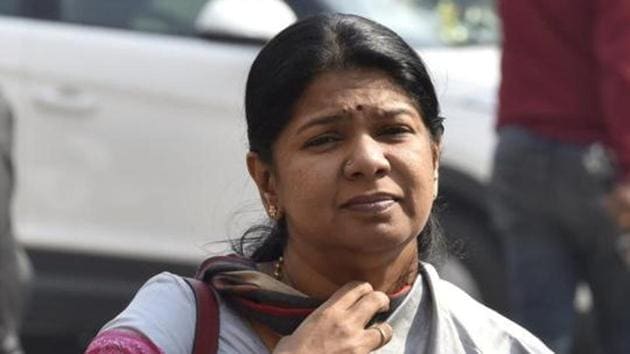‘Was asked if I’m Indian by CISF official as I don’t know Hindi’: DMK lawmaker Kanimozhi
Reacting to Kanimozhi’s tweet, the Central Industrial Security Force, which is responsible for security at airports in the country, asked the MP to share details of the incident and said an enquiry has been ordered into the matter.
DMK lawmaker Kanimozhi on Sunday said that a CISF official asked if “she was an Indian” when she expressed her inability to speak in Hindi. The Member of Parliament also asked if “being Indian was equal to knowing Hindi”.

“Today at the airport a CISF officer asked me if “I am an Indian” when I asked her to speak to me in tamil or English as I did not know Hindi. I would like to know from when being indian is equal to knowing Hindi,” Kanimozhi said in a tweet.
The incident reportedly happened at Chennai airport when the Thoothukkodi MP arrived there to board a flight to Delhi in the afternoon, news agency PTI reported quoting DMK party sources.
Reacting to her tweet, the Central Industrial Security Force, which is responsible for security at airports in the country, asked the MP to share details of the incident and said an enquiry has been ordered into the matter.
“The CISF has ordered an Enquiry into the matter. It is not the policy of CISF to insist upon any particular language,” said a tweet by the paramilitary force.
The MP thanked CISF for the “immediate response and assurance to take action.”
The issue of so-called imposition of Hindi language has been a sore point with the southern states including Tamil Nadu where the DMK is the main opposition party. It is once again in news following the Centre’s announcement of the New Education Policy (NEP) last month which has adopted a three-language formula.
Earlier this week, Tamil Nadu chief minister Edappadi K Palaniswami rejected the three-language formula, saying that the state will not change its two-language policy.
“We are saddened by the three-language formula introduced by the central government in National Education Policy (NEP) 2020. Our state is already following two-language policy (of Tamil and English) for decades and there will be no changes in it,” Palaniswami said after chairing a cabinet meeting in Chennai.
He requested the Prime Minister to “allow states to make a decision as per their own policy”.
The MK Stalin-led Dravida Munnetra Kazhagam (DMK) and many opposition parties in Tamil Nadu have also opposed the new education policy and want a review of the sweeping reforms it has proposed.
The DMK chief has said the NEP was an attempt at alleged imposition of Hindi and Sanskrit and vowed to fight against it by joining hands with like-minded political parties and chief ministers of other states.
However, the Centre has denied the charge of trying to impose any language on any state. Union HRD minister Ramesh Pokhriyal Nishank has said that the Centre will not impose any language on any state through NEP. Nishank posted the clarification through a tweet in Tamil while replying to former Union minister from Tamil Nadu Pon Radhakrishnan.
“I would once again like to insist that the central government will not impose any language on any state,” Nishank said last week.






